Diploma in Pharmacy (D.Pharm)
- Duration - 2 years
- Limited Seats
The Innovative College of Pharmacy, Greater Noida is spread across 5.75 acres of lush, green, and pollution-free surroundings, offering an ideal environment for learning and research. Located next to the India Expo Mart, the campus combines excellent connectivity with a peaceful setting, fostering academic excellence and personal growth. Equipped with modern infrastructure, advanced laboratories, a well-stocked library, and spacious lecture halls, the college provides students with a vibrant and inspiring place to learn, innovate, and excel.
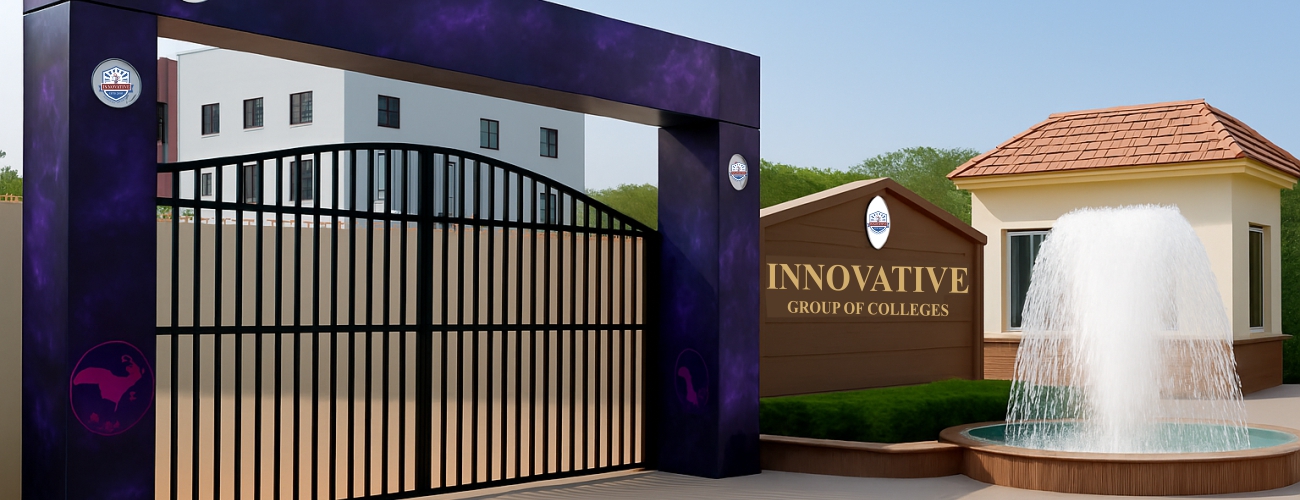
HUMAN ANATOMY & PHYSIOLOGY LAB
The Human Anatomy and Physiology (HAP) Lab at Innovative College of Pharmacy is well-equipped to provide students with hands-on understanding of the human body's structure and function. The lab features anatomical models, charts, dissection tools, and microscopes, enabling students to gain practical knowledge of organs, tissues, and physiological processes.
Under the guidance of experienced faculty, students perform experiments and learn various techniques essential for pharmacy practice, laying a strong foundation in biomedical sciences.
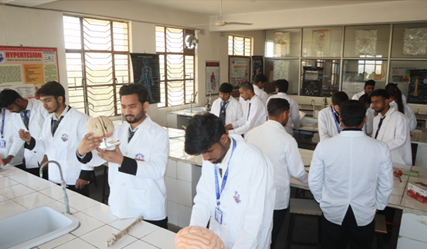

PHARMACOLOGY LAB
The Pharmacology Lab at Innovative College of Pharmacy is designed to provide students with practical knowledge of drug actions, interactions, and therapeutic uses. The lab is equipped with advanced instruments such as organ bath setups, rotarod apparatus, actophotometer, analgesiometers, and software-based simulation tools for demonstrating pharmacological experiments. Students gain hands-on experience in studying the effects of drugs on various biological systems through in-vitro and in-vivo models (as per regulatory guidelines). The lab helps in building a strong foundation in experimental pharmacology, essential for careers in drug research, clinical trials, and healthcare.
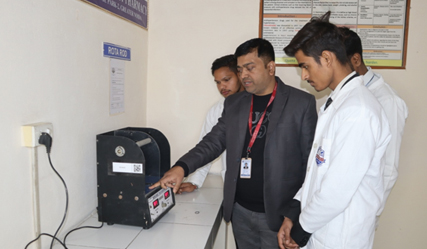
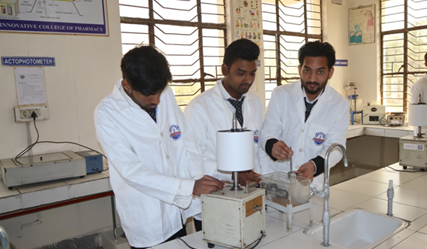

PHARMACEUTICAL CHEMISTRY LAB
Pharmaceutical Chemistry laboratories serve as specialized facilities where students and researchers explore the vast field of medicinal science through practical experimentation. These laboratories cover a wide range of disciplines, including medicinal and analytical chemistry, organic chemistry, biochemistry, inorganic pharmaceutical chemistry, and pharmaceutical analysis. Each lab is meticulously designed to provide an environment conducive to learning and innovation. They are equipped with the latest, industry-standard instruments and analytical tools, enabling students to gain valuable hands-on experience that bridges the gap between theoretical knowledge and real-world applications. Through these practical sessions, learners not only develop technical skills but also cultivate critical thinking, problem-solving abilities, and an understanding of modern pharmaceutical practices. By working directly with sophisticated equipment—such as spectrophotometers, chromatographic systems, and chemical synthesis apparatus—students can perform complex experiments, analyze results with precision, and deepen their comprehension of drug development, quality control, and chemical analysis. Ultimately, these laboratories prepare future pharmacists, chemists, and researchers to meet the demands of the pharmaceutical industry and contribute meaningfully to healthcare advancements.
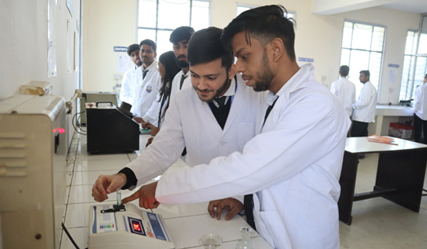
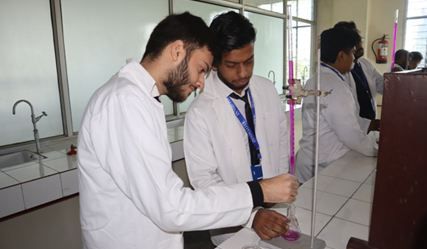

PHARMACOGNOSY LAB
Pharmacognosy laboratories are specialized facilities designed to explore the origin, structure, and properties of natural drugs derived from plants and other natural sources. These laboratories are equipped with a wide range of advanced instruments, including simple, compound, binocular, and projection microscopes, as well as stage and eye-piece micrometers, enabling students to study the morphological and microscopical characteristics of various plant drugs in detail.
To facilitate the extraction and isolation of active constituents from natural sources, the labs also feature Clevenger apparatus for essential oil extraction and Soxhlet apparatus for continuous solvent extraction of crude drugs. These setups allow learners to understand the practical processes involved in natural product research, from plant identification and microscopic evaluation to the separation and analysis of bioactive compounds.
Through hands-on training, students gain a comprehensive understanding of pharmacognostic evaluation techniques, quality control of herbal materials, and the scientific basis of traditional medicine, equipping them with the skills required for research and development in herbal and pharmaceutical industries.
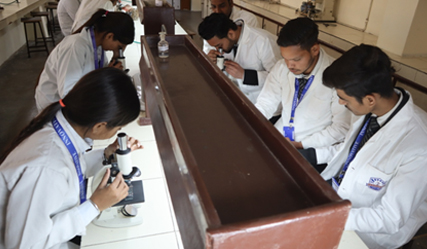
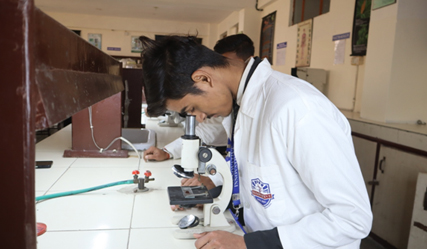

HERBAL GARDEN
The institute proudly maintains a well-developed herbal garden within the campus, serving as a living repository of medicinal and aromatic plant wealth. Spread across a thoughtfully planned area, the garden nurtures around 100 species of important traditional medicinal and aromatic plants, including a variety of herbs, shrubs, and trees, each flourishing under optimal care.
Equipped with a well-organized irrigation system and scientifically designed cultivation beds, the garden ensures the healthy growth and propagation of plant species. The plant materials, sourced from diverse agro-climatic zones, offer students exposure to a wide range of botanical diversity. The garden’s primary objectives include supporting experimental work, facilitating botanical studies, and initiating ex-situ conservation of rare and endangered medicinal plants, preserving them for future generations.
By observing these plants in an environment that closely resembles their natural habitat, students gain valuable insight into their morphological characteristics, growth patterns, and medicinal significance. The garden also serves as a sustainable source of plant material for practical sessions and research activities of B. Pharm students, thereby integrating traditional knowledge with modern scientific learning.
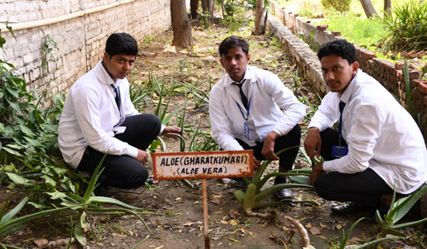
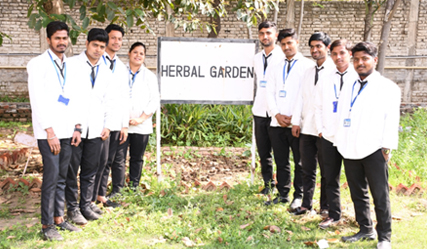

MACHINE ROOM
This laboratory serves as a dedicated facility for basic formulation training, providing students with practical exposure to the machinery and techniques used in pharmaceutical manufacturing. The machine room is equipped with a comprehensive range of equipment, enabling hands-on learning in various dosage form preparations.
Key instruments include tablet punching machines (both manual and automatic) for tablet compression, an ointment mill for semi-solid preparation, and a liquid filling machine for precise dispensing of liquid formulations. For parenteral dosage forms, the lab houses ampoule washing machines and ampoule sealing machines, ensuring students understand the fundamentals of sterile product handling.
Additionally, equipment such as the ball mill for size reduction, double cone blender for uniform mixing of powders, capsule filling machine for encapsulation, coating pan for tablet coating, and mechanical sieving machine for particle size separation, provide comprehensive training in pharmaceutical production techniques. The facility also features a mixer-cum-grinder and specialized apparatus to study the flow of fluids and frictional losses, helping students grasp essential concepts in pharmaceutics and process engineering.
By working with these machines, learners develop technical competence, operational skills, and an understanding of Good Manufacturing Practices (GMP), preparing them for careers in the pharmaceutical industry.

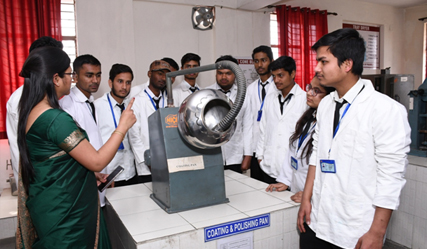

PHARMACEUTICS LAB
The Pharmaceutics Laboratory is a state-of-the-art facility designed to provide students with practical skills in the formulation, development, and evaluation of various pharmaceutical dosage forms. It serves as a bridge between theoretical pharmaceutics and real-world pharmaceutical manufacturing practices.
The laboratory is equipped with a wide range of modern instruments and formulation equipment, including tablet punching machines (manual and automatic), ointment mills, liquid filling machines, ampoule washing and sealing machines, ball mills, double cone blenders, capsule filling machines, coating pans, mechanical sieving machines, and mixer-cum-grinders. Additionally, specialized setups are available for studying the flow of fluids and frictional losses, offering students deeper insight into pharmaceutical engineering concepts.
Here, students learn to prepare tablets, capsules, ointments, syrups, suspensions, emulsions, and sterile products, while gaining knowledge of Good Manufacturing Practices (GMP) and quality control techniques. The hands-on training not only enhances their technical competence but also prepares them for industrial roles in formulation development, production, and regulatory compliance
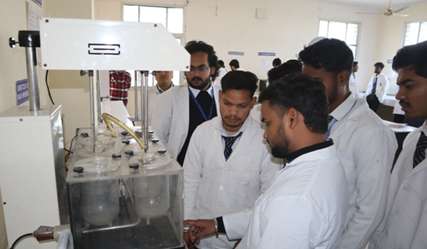
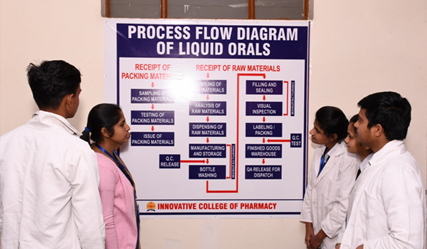

MICROBIOLOGY LAB
The Microbiology Laboratory is a specialized facility designed to provide students with practical knowledge and skills in microbiological techniques essential for pharmaceutical and biomedical sciences. It offers a controlled, sterile environment for the study, cultivation, and identification of microorganisms relevant to healthcare, research, and industry.
The lab is equipped with laminar air flow units, autoclaves, incubators, hot air ovens, colony counters, microscopes (simple, compound, and binocular), and BOD incubators for microbial culture and analysis. Facilities are also available for performing sterility testing, microbial limit tests, antibiotic assay studies, and environmental monitoring.
Students gain hands-on experience in techniques such as media preparation, staining, aseptic transfer, microbial enumeration, and antibiotic sensitivity testing. The lab also supports studies in pharmaceutical microbiology, including microbial contamination control, preservation techniques, and the evaluation of antimicrobial agents.
By working in this laboratory, students develop critical skills in quality assurance, sterile manufacturing, and microbiological testing, preparing them for roles in pharmaceutical production, research laboratories, and regulatory compliance.
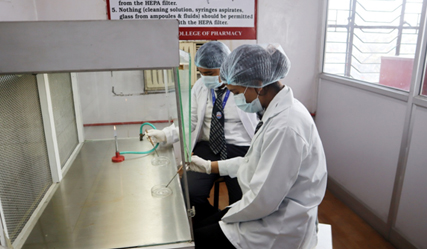
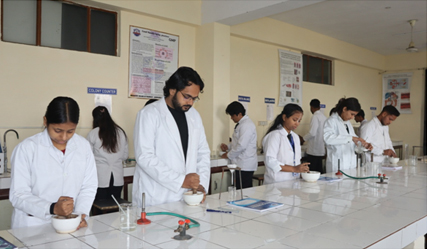

ANIMAL HOUSE
The institute maintains a well-equipped and CPCSEA-approved Animal House facility to support research and training in pharmacology, toxicology, and related biomedical sciences. Designed in compliance with ethical guidelines and Good Laboratory Practices (GLP), the facility provides a controlled environment for the care and maintenance of laboratory animals.
The Animal House is equipped with proper ventilation, temperature and humidity control, and regular sanitation protocols to ensure animal welfare. It houses commonly used experimental species such as rats, mice, rabbits, and guinea pigs, maintained in clean, well-ventilated cages with access to balanced diets and purified water
The facility supports in-vivo experiments essential for evaluating the pharmacological effects, safety, and toxicity of new drug molecules. All activities are conducted under the supervision of qualified personnel, strictly following the Committee for the Purpose of Control and Supervision of Experiments on Animals (CPCSEA) guidelines.
Through this facility, students and researchers gain practical exposure to animal handling techniques, dose administration, behavioral studies, and ethical experimentation, fostering responsible and humane approaches to biomedical research.
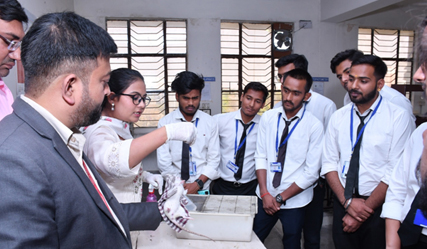
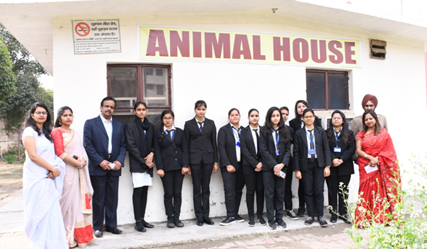

DRUG INFORMATION CENTER (DIC)
The Drug Information Centre (DIC) of the innovative College of Pharmacy is a centre of excellence dedicated to providing reliable, unbiased, and evidence-based drug information. The centre is designed to help healthcare professionals, students, researchers, and patients advance safe, logical, and effective drug practices.
The DIC is a trusted knowledge hub that improves clinical decision-making and increases patient safety. The centre exemplifies the institution's commitment to academic quality, research advancement, and community healthcare support.By bridging the gap between pharmacological knowledge and clinical application, the Drug Information Centre actively contributes to better therapeutic outcomes and the promotion of responsible medication use.
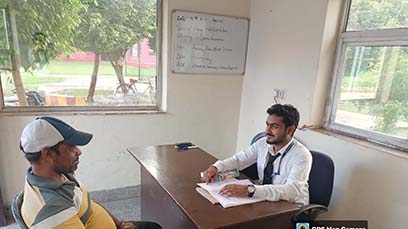
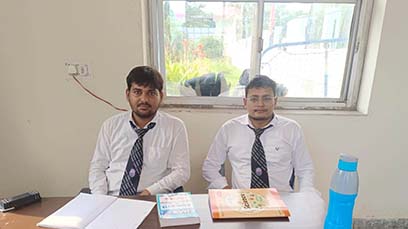
CENTRAL INSTRUMENTATION LAB
The Central Instrumentation Laboratory is a state-of-the-art facility that serves as the core hub for advanced analytical and research activities in pharmaceutical sciences. It is equipped with high-precision instruments used for drug analysis, quality control, and research applications, enabling students and researchers to gain hands-on experience with sophisticated analytical techniques.
Key equipment includes UV-Visible Spectrophotometers, High-Performance Liquid Chromatography (HPLC) systems, Flame Photometers, Nepheloturbidimeters, Fluorimeters, Conductivity Meters, Potentiometers, Refractometers, Karl Fischer Titrators, and Digital pH Meters. The lab also features instruments for moisture content determination, particle size analysis, and dissolution testing.
This facility allows learners to conduct qualitative and quantitative analysis of pharmaceuticals, validate analytical methods, and perform drug stability studies in compliance with industry standards. Students develop critical skills in instrument calibration, operation, and troubleshooting, preparing them for careers in R&D, quality assurance, and regulatory laboratories.
By integrating practical training with real-time analytical problem-solving, the Central Instrumentation Laboratory bridges the gap between classroom learning and industrial practices.
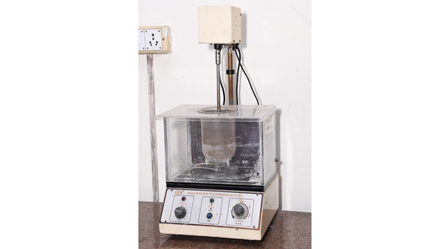
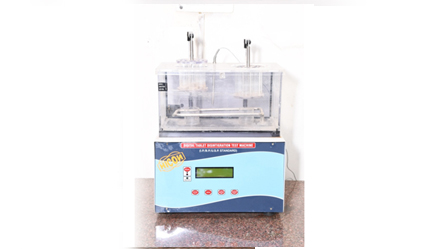

COMPUTER LAB
The Computer Laboratory is a modern, technology-enabled facility designed to enhance the digital learning experience of students and support academic, research, and professional development activities. It provides a platform for students to acquire IT skills, data analysis techniques, and software proficiency essential for the pharmaceutical and healthcare sectors.
The lab is equipped with high-performance computers, high-speed internet connectivity, and updated academic and research software such as molecular modeling tools, statistical analysis programs, simulation software, and presentation design applications. Each workstation is ergonomically designed to ensure a comfortable and productive working environment.
In addition to supporting coursework, the Computer Lab facilitates online learning, research projects, data interpretation, report preparation, and digital presentations. It also serves as a hub for bioinformatics training, pharmaceutical data analysis, and computer-aided drug design (CADD), helping students integrate technology into pharmaceutical sciences. With continuous technical support and an emphasis on practical skill-building, the Computer Laboratory prepares students for the digital demands of the modern pharmaceutical industry and fosters technological confidence in their professional journey.
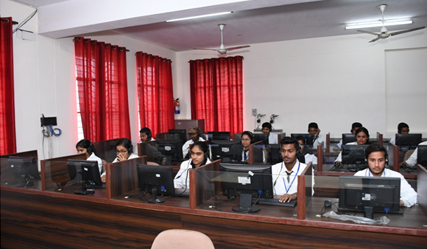
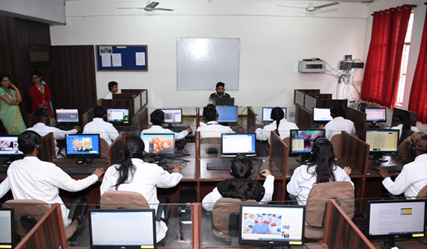

MEDICAL FACILITY
The college offers an on-campus medical facility to ensure the health and safety of students, faculty, and staff. A qualified medical professional is available to provide first aid, basic treatment, and health consultations. The facility is equipped with essential medicines and emergency care equipment, with quick referral arrangements to nearby hospitals for specialized treatment.
Regular health check-ups, vaccination camps, and wellness programs are also organized, ensuring a healthy and supportive campus environment.

